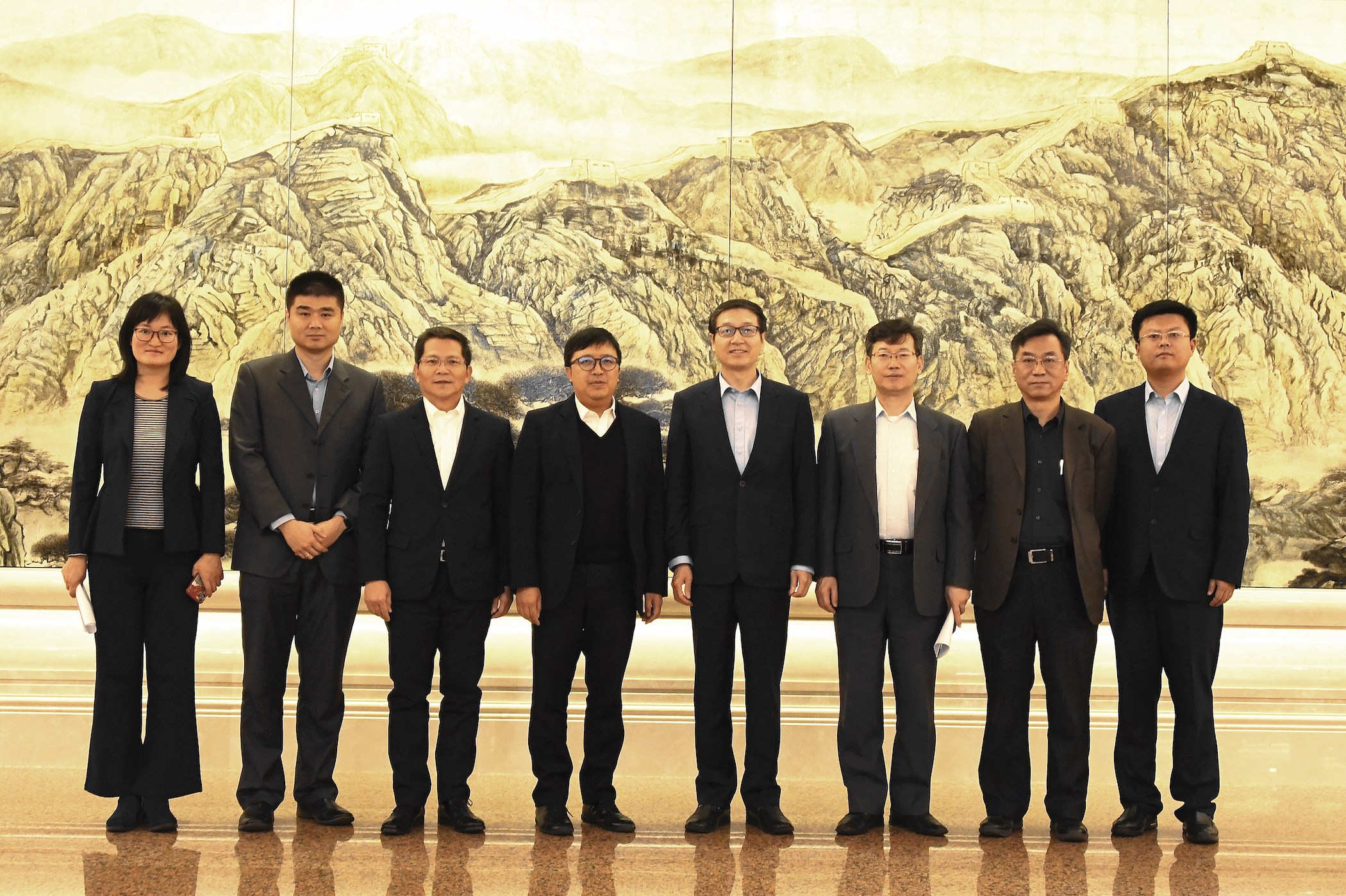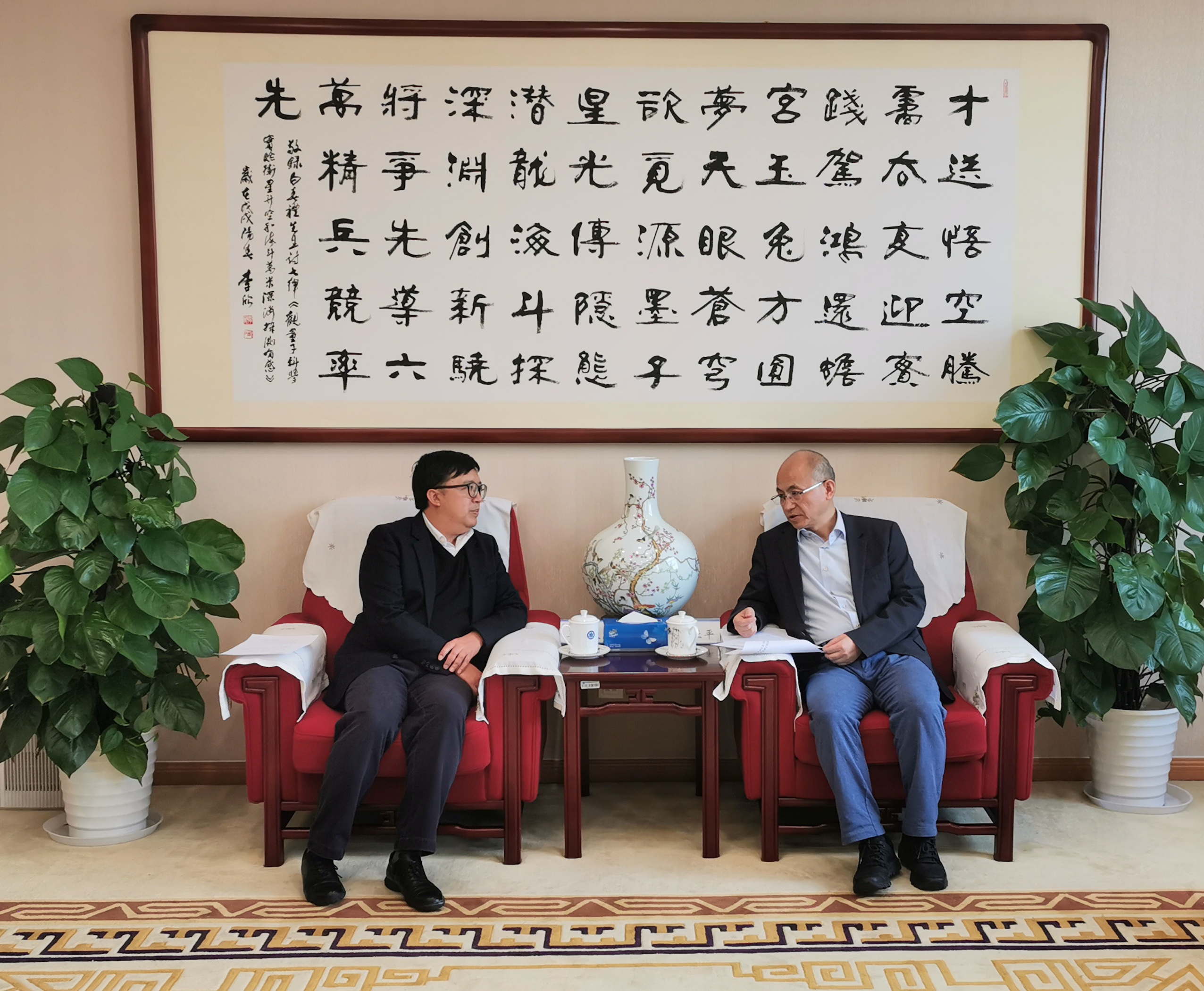FDCT Visited Beijing for Cooperation Discussion
11/01/2020
11/01/2020
Ma Chi Ngai Frederico, President of the Administrative Committee of the Science and Technology Development Fund (FDCT) led a delegation to Beijing for participation in the National Science and Technology Award Conference upon the invitation of the National Office for Science and Technology Awards under the Ministry of Science and Technology. The delegation visited the Ministry of Science and Technology, Cyberspace Administration of China and Chinese Academy of Sciences. They also paid visits to the China Association for Science and Technology, National Natural Science Foundation of China, National Administration of Traditional Chinese Medicine and China Internet Development Foundation. They were received by, among others, Huang Wei, Vice Minister of Science and Technology; Zhang Yaping, Vice President of Chinese Academy of Sciences; Sun Da, Vice Director of the National Administration of Traditional Chinese Medicine; Ma Li, President of China Internet Development Foundation; Shu Wei, Secretary of the Secretariat of the China Association for Science and Technology; Liang Hao, Deputy Director General of the Bureau of Hong Kong, Macao and Taiwan Affairs, Cyberspace Administration of China and Yang Junlin, Director of the Hong Kong, Macao and Taiwan Affairs Office under the National Natural Science Foundation of China.
In the meetings, Ma expressed gratitude to these science and technology (S&T) departments for their persistent support and assistance for Macao’s scientific and technological development and introduced the SAR government’s new directions for development in these areas. He said that President Xi Jinping made an important speech during his participation in the celebration of the 20th anniversary of Macao’s handover. While putting forward four aspirations for Macao and making five requests for the government, Xi mentioned the tasks of expediting the development of Macao as a smart city and focusing on key projects conducive to the city achieving moderate economic diversity, for instance, which are closely related to the city’s technological development; the Chief Executive Ho Iat Seng also stated in his inauguration speech the necessity to nurture emerging industries including traditional Chinese medicine industry and high-tech industry, as well as to foster their development. From these, it can be seen that as technology advances, it will not only play the role of promoting scientific research and science popularization in Macao, but also a greater role in supporting the city’s social and economic development. High technology in particular can be used to boost the development of the city’s traditional industries and new sources of economic growth can be identified during the transfer and transformation of S&T achievements. In light of this, FDCT will keep innovating on its funding models, studying and launching a range of funding schemes according to the needs of the S&T sector, and promote transfer and transformation of S&T achievements, with a focus on facilitating the application of technology to help the city reach its goal of attaining moderate economic diversity, closely in line with the SAR government’s economic as well as S&T policies.
FDCT had in-depth exchanges with the said departments on the details and arrangements of their work in 2020. They involve the National Key R&D Programs opening for applications from a wider range of Macao applicants; Excellent Young Scientists Fund opening for applications from Hong Kong and Macao; the arrangements of joint research funding projects and methods of summarizing research results; the arrangements of the 14th meeting of the Mainland and Macao Science and Technology Cooperation Committee; the 9th Training Course in Chinese Medicine Quality Assurance; a training course for Macao’s workers in science and technology; Internet + Smart City Summit; cooperation in holding academic symposiums; staff exchanges and human genetic resources transfer across borders and so on. Besides, they exchanged opinions and had discussions about such topics as the ways of innovating on their cooperation mechanisms, building and supporting new collaboration platforms, promoting Macao’s S&T innovation and development as well as facilitating the transformation of the Guangdong-Hong Kong-Macao Greater Bay Area into an international innovation and technology hub, in addition to making use of Macao’s platform role to propel the transfer of S&T achievements between China and Portuguese-speaking countries and the transformation of the achievements. The departments acknowledged that there had been significant and rapid improvement in Macao’s technological strength and technological development level in the past 20 years since the city’s handover, and it is known for R&D achievements in some technological areas. They said that the S&T sectors of the two regions had been active in working with each other, leading to increasingly closer and deeper cooperation between them. The representatives of these departments said they would keep supporting Macao’s science research, technological development, innovation and entrepreneurship, S&T popularization, technology transfer, platform and talent development and high-tech industry among others, while working with Macao in promoting technological collaboration and exchanges between the two sides.
On the other hand, the delegation also met with members of the evaluation committee of Macao Science and Technology Awards in Beijing, whom they briefed on the work arrangements of Macao S&T Awards this year. The members concerned were Zhu Lilan, Yang Wei, Mei Hong, Han Yingduo, Huang Luqi. The delegates included Cheang Kun Wai, member of FDCT Administrative Committee and Ip Kuai Lam, senior manager of FDCT S&T Development and Research Department.

Sun Da, Vice Director of the National Administration of Traditional Chinese Medicine, received the delegation

Zhang Yaping, Vice President of Chinese Academy of Sciences, received the delegation
In the meetings, Ma expressed gratitude to these science and technology (S&T) departments for their persistent support and assistance for Macao’s scientific and technological development and introduced the SAR government’s new directions for development in these areas. He said that President Xi Jinping made an important speech during his participation in the celebration of the 20th anniversary of Macao’s handover. While putting forward four aspirations for Macao and making five requests for the government, Xi mentioned the tasks of expediting the development of Macao as a smart city and focusing on key projects conducive to the city achieving moderate economic diversity, for instance, which are closely related to the city’s technological development; the Chief Executive Ho Iat Seng also stated in his inauguration speech the necessity to nurture emerging industries including traditional Chinese medicine industry and high-tech industry, as well as to foster their development. From these, it can be seen that as technology advances, it will not only play the role of promoting scientific research and science popularization in Macao, but also a greater role in supporting the city’s social and economic development. High technology in particular can be used to boost the development of the city’s traditional industries and new sources of economic growth can be identified during the transfer and transformation of S&T achievements. In light of this, FDCT will keep innovating on its funding models, studying and launching a range of funding schemes according to the needs of the S&T sector, and promote transfer and transformation of S&T achievements, with a focus on facilitating the application of technology to help the city reach its goal of attaining moderate economic diversity, closely in line with the SAR government’s economic as well as S&T policies.
FDCT had in-depth exchanges with the said departments on the details and arrangements of their work in 2020. They involve the National Key R&D Programs opening for applications from a wider range of Macao applicants; Excellent Young Scientists Fund opening for applications from Hong Kong and Macao; the arrangements of joint research funding projects and methods of summarizing research results; the arrangements of the 14th meeting of the Mainland and Macao Science and Technology Cooperation Committee; the 9th Training Course in Chinese Medicine Quality Assurance; a training course for Macao’s workers in science and technology; Internet + Smart City Summit; cooperation in holding academic symposiums; staff exchanges and human genetic resources transfer across borders and so on. Besides, they exchanged opinions and had discussions about such topics as the ways of innovating on their cooperation mechanisms, building and supporting new collaboration platforms, promoting Macao’s S&T innovation and development as well as facilitating the transformation of the Guangdong-Hong Kong-Macao Greater Bay Area into an international innovation and technology hub, in addition to making use of Macao’s platform role to propel the transfer of S&T achievements between China and Portuguese-speaking countries and the transformation of the achievements. The departments acknowledged that there had been significant and rapid improvement in Macao’s technological strength and technological development level in the past 20 years since the city’s handover, and it is known for R&D achievements in some technological areas. They said that the S&T sectors of the two regions had been active in working with each other, leading to increasingly closer and deeper cooperation between them. The representatives of these departments said they would keep supporting Macao’s science research, technological development, innovation and entrepreneurship, S&T popularization, technology transfer, platform and talent development and high-tech industry among others, while working with Macao in promoting technological collaboration and exchanges between the two sides.
On the other hand, the delegation also met with members of the evaluation committee of Macao Science and Technology Awards in Beijing, whom they briefed on the work arrangements of Macao S&T Awards this year. The members concerned were Zhu Lilan, Yang Wei, Mei Hong, Han Yingduo, Huang Luqi. The delegates included Cheang Kun Wai, member of FDCT Administrative Committee and Ip Kuai Lam, senior manager of FDCT S&T Development and Research Department.

Sun Da, Vice Director of the National Administration of Traditional Chinese Medicine, received the delegation

Zhang Yaping, Vice President of Chinese Academy of Sciences, received the delegation

Office address: Avenida do Infante D. Henrique, No. 43-53A, Macau Square, 8th Floor, Unit C and 11th Floor, Unit K, Macao (To apply for project funding, please go to 11th Floor, Unit K)
Office hours: Monday to Thursday: 9:00-13:00, 14:30-17:45;Friday: 9:00-13:00, 14:30-17:30;Tel.: 28788777
Copyright(C) 2021 ALL right reserved.
Office hours: Monday to Thursday: 9:00-13:00, 14:30-17:45;Friday: 9:00-13:00, 14:30-17:30;Tel.: 28788777
Copyright(C) 2021 ALL right reserved.

